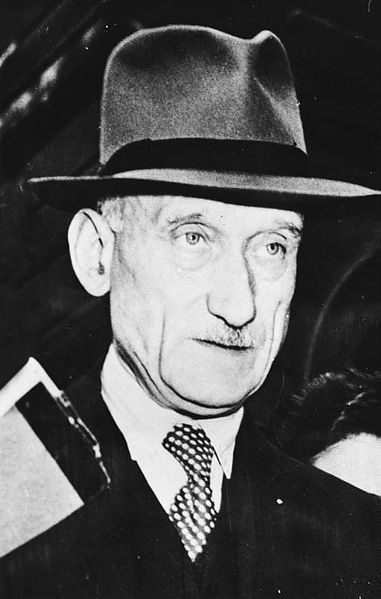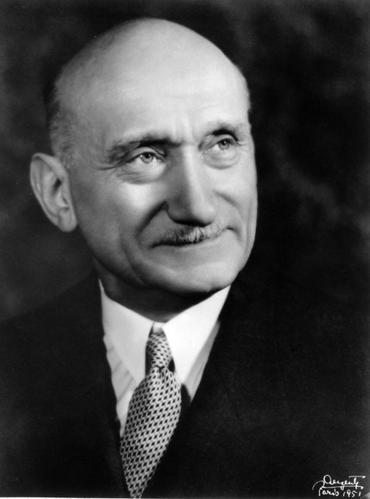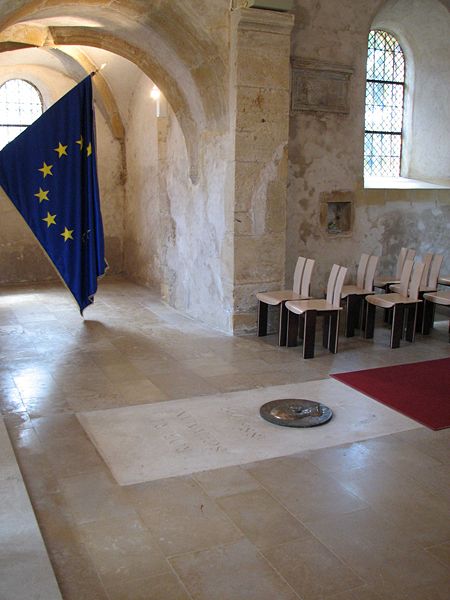<Back to Index>
- Physician William James Mayo, 1861
- Writer Antoine de Saint-Exupéry, 1900
- Prime Minister of France Robert Schuman, 1886
PAGE SPONSOR



Robert Schuman (29 June 1886 – 4 September 1963) was a noted Luxembourgish-born French statesman. Schuman was a Christian Democrat (M.R.P.) and an independent political thinker and activist. Twice Prime Minister of France, a reformist Minister of Finance and a Foreign Minister, he was instrumental in building post-war European and trans-Atlantic institutions and is regarded as one of the founders of the European Union, the Council of Europe and NATO.
Schuman was a man of several cultures. His father, Jean-Pierre Schuman (1837 – 1900), was born in Évrange, Lorraine, just across the border with Luxembourg. Jean-Pierre Schuman was a French citizen but after Alsace-Lorraine was annexed by the German Empire in 1871, he became a German citizen. Robert's mother, Eugénie Duren (1864 – 1911), a Luxembourgian born in Bettembourg, became a German citizen by marriage in 1884. Schuman was born in 1886 in Clausen, a suburb of Luxembourg as a German by virtue of the principle of jus sanguinis. His mother tongue was Luxembourgish but he was taught French and Standard German at school. Since he learned French only in school (which is mandatory in Luxembourg) he spoke it with a distinct accent.
Schuman pursued his secondary education at the Athénée de Luxembourg secondary school in Luxembourg, a former Jesuit College. He then decided to study at German universities, but since the Luxembourg secondary school diploma was not valid in Germany, he had to pass the entrance exam at the Kaiserliches Gymnasium in Metz. His university education in law, economics, political philosophy, theology and statistics took place in the German education system. He received his law degree after studying at the universities of Bonn, Munich, Berlin, and Strasbourg in Alsace.
After graduation he became a lawyer and was elected to the city council of Metz. After the First World War, Alsace-Lorraine was returned to France and Schuman became a French citizen in 1919. Schuman became active in French politics. In 1919 he was first elected as député to parliament on a regional list, and later serving as the député for Thionville until 1958 with an interval during the war years. He made a major contribution to the drafting and parliamentary passage of the Lex Schuman by the French parliament. Schuman also investigated and patiently uncovered postwar corruption in the Lorraine steel industries.
In
1940, because of his expertise on Germany, Schuman was called to become
a member of Paul Reynaud's wartime government. Later that year, he was
arrested for acts of resistance and protest against Nazi methods. He was interrogated by the Gestapo but thanks to the intervention of a German lawyer, he was saved from being sent to Dachau. Transferred as a personal prisoner of Gauleiter Joseph Buerckel, he escaped in 1942 and re-joined the French Resistance. He addressed large conferences in the Free Zone explaining
why the defeat of Germany was inevitable. This was at a time when Nazi
Germany was at the peak of its power. The Germans then invaded the Free Zone.
Although his life was still at risk, he spoke to friends about a
Franco-German and European reconciliation that must take place after
the end of hostilities, as he had already done in 1939-40. After the war Schuman rose to great prominence. He was Minister of Finance, then Prime Minister from
1947 – 1948, assuring parliamentary stability during a period of
revolutionary strikes and attempted insurrection. He was part of the Third Force coalition governments which opposed both the Communists and Gaullists who wished to change the Constitution by intimidation rather than the ballot box.
The Communists at one point seized and occupied Parliament but he was
able to diffuse both these threats to the State by firmness and
fairness. In the last days of his first administration, his government
proposed plans that later resulted in the Council of Europe and the
European Community single market. Becoming Foreign Minister in
1948, he retained the post in different governments until early 1953.
When Schuman's first government had proposed the creation of a European
Assembly, it made the issue a governmental matter for Europe, not
merely an academic discussion or the subject of private conferences,
like The Hague Congress of
the European Movements earlier that year. (Schuman's was one of the few
governments to send active ministers.) This proposal saw life as the
Council of Europe and was created within the tight schedule Schuman had
set. At the signing of its Statutes at St James's Palace, London, 5 May
1949, the founding States agreed to defining the frontiers of Europe
based on the principles of human rights and fundamental freedoms that
Schuman enunciated there. He also announced a coming supranational union for Europe that saw light as the European Coal and Steel Community and other such Communities within a Union framework of common law and democracy. We
are carrying out a great experiment, the fulfillment of the same
recurrent dream that for ten centuries has revisited the peoples of
Europe: creating between them an organization putting an end to war and guaranteeing an eternal peace.
The Roman church of the Middle Ages failed finally in its attempts that
were inspired by humane and human preoccupations. Another idea, that of
a world empire constituted under the auspices of German emperors was
less disinterested; it already relied on the unacceptable pretensions
of a ‘Führertum’ (domination by dictatorship) whose 'charms' we have all experienced. Audacious minds, such as Dante, Erasmus, Abbé de St-Pierre, Rousseau, Kant and Proudhon,
had created in the abstract the framework for systems that were both
ingenious and generous. The title of one of these systems became the
synonym of all that is impractical: Utopia, itself a work of genius, written by Thomas More, the Chancellor of Henry VIII, King of England. … The European spirit signifies being conscious of belonging to a cultural family and to have a willingness to serve that community in
the spirit of total mutuality, without any hidden motives of hegemony
or the selfish exploitation of others. The 19th century saw feudal
ideas being opposed and, with the rise of a national spirit,
nationalities asserting themselves. Our century, that has witnessed the
catastrophes resulting in the unending clash of nationalities and
nationalisms, must attempt and succeed in reconciling nations in a supranational association.
This would safeguard the diversities and aspirations of each nation
while coordinating them in the same manner as the regions are
coordinated within the unity of the nation. – Robert Schuman, speaking in Strasbourg, 16 May 1949 As
Foreign Minister, he announced in September 1948 and the following year
before the United Nations General Assembly, France's aim to create a
democratic organisation for Europe which a post-Nazi and democratic
Germany could join. In 1949 – 50, he made a series of speeches in Europe and North America about creating a supranational European Community. This supranational structure, he said, would create lasting peace between Member States. Our
hope is that Germany will commit itself on a road that will allow it to
find again its place in the community of free nations, commencing with
that European Community of which the Council of Europe is a herald. – Robert Schuman, speaking at the United Nations, 23 September 1949 On 9 May 1950, these principles of supranational democracy were announced in what has become known as the Schuman Declaration. The
text was jointly prepared by Paul Reuter, the legal adviser at the
Foreign Ministry, his chef de Cabinet, Bernard Clappier and Jean Monnet and two of his team, Pierre Uri and Etienne Hirsch.
The French Government agreed to the Schuman Declaration which invited
the Germans and all other European countries to manage their coal and
steel industries jointly and democratically in Europe's first supranational Community with its five foundational institutions. On 18 April 1951 six founder members signed the Treaty of Paris (1951) that formed the basis of the European Coal and Steel Community. They declared this date and the corresponding democratic, supranational principles to be the 'real foundation of Europe'. Three Communities have been created so far. The Treaties of Rome, 1957, created the Economic community and the nuclear non-proliferation Community, Euratom. Together with intergovernmental machinery of later treaties, these eventually evolved into the European Union. The Schuman Declaration, was made on 9 May 1950 and to this day 9 May is designated Europe Day. As Prime Minister and Foreign Minister Schuman was instrumental in the creation of the North Atlantic Treaty Organisation,
NATO. Schuman also signed the Treaty of Washington for France.The
defensive principles of Nato's Article 5 were also repeated in the European Defence Community Treaty
which failed as the French National Assembly declined to vote its
ratification. Schuman was a proponent of an Atlantic Community. This
was strongly resisted by Communists, ultranationalists and Gaullists. Schuman later served as Minister of Justice before becoming the first President of the European Parliamentary Assembly (the successor to the Common Assembly) which bestowed on him by acclamation the title 'Father of Europe'. He is considered one of the founding fathers of the European Union. In 1958 he received the Karlspreis, an Award by the German city of Aachen to people who contributed to the European idea and European peace, commemorating Charlemagne, ruler of what is today France and Germany, who resided and is buried at Aachen. He was also a knight of the Order of Pope Pius IX. Celibate,
modest and un-ostentatious, Schuman was an intensely religious man and
Bible scholar. He was a strongly independent thinker, meditative and a
courageous political activist. He commended the writings of Pope Pius XI who condemned both Fascism and Communism. He was expert in medieval philosophy including St. Thomas Aquinas and considered Jacques Maritain highly. It was announced on 15 May 2004 that the diocesan investigation of the cause of beatification would soon conclude, this might have as its result that Schuman will be declared "Blessed" by the Roman Catholic Church. The Schuman District of Brussels (including a metro/railway station, square) is named in his honour. Around the square ("Schuman roundabout") can be found various European institutions, including the Berlaymont building which is the headquarters of the European Commission and has a monument to Schuman outside, as well as key European Parliament buildings. In the nearby Cinquantenaire Park, there is a bust of Schuman as a memorial to him. A Social Science University named after him lies in Strasbourg (France) along with the Avenue du President Robert Schuman in that city's European Quarter.
In Luxembourg there is a Rond Point Schuman, Boulevard Robert Schuman
and a Robert Schuman Building of the European Parliament. The house
where he was born was restored by the European Parliament and can be
visited; as can his home in Scy-Chazelle just outside Metz. In
Aix-en-Provence, a town in Bouches-du-Rhone, France, there is an Avenue
Robert Schumann, which houses the three university buildings of the
town and in Ireland there is a building in the University of Limerick named the "Robert Schuman" building.
Schuman
has left such a legacy behind, that he was the main motive for one of
the most recent and famous gold commemorative coin: the Belgian 3 pioneers of the European unification gold coin, minted in 2002. The obverse side shows a portrait with the names Robert Schuman, Paul-Henri Spaak and Konrad Adenauer.